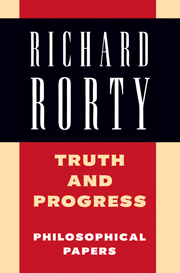Book contents
- Frontmatter
- Contents
- Introduction
- I Truth and Some Philosophers
- 1 Is Truth a Goal of Inquiry? Donald Davidson versus Crispin Wright
- 2 Hilary Putnam and the Relativist Menace
- 3 John Searle on Realism and Relativism
- 4 Charles Taylor on Truth
- 5 Daniel Dennett on Intrinsicality
- 6 Robert Brandom on Social Practices and Representations
- 7 The Very Idea of Human Answerability to the World: John McDowell's Version of Empiricism
- 8 Antiskeptical Weapons: Michael Williams versus Donald Davidson
- II Moral Progress: Toward More Inclusive Communities
- III The Role of Philosophy in Human Progress
- Index
4 - Charles Taylor on Truth
Published online by Cambridge University Press: 06 July 2010
- Frontmatter
- Contents
- Introduction
- I Truth and Some Philosophers
- 1 Is Truth a Goal of Inquiry? Donald Davidson versus Crispin Wright
- 2 Hilary Putnam and the Relativist Menace
- 3 John Searle on Realism and Relativism
- 4 Charles Taylor on Truth
- 5 Daniel Dennett on Intrinsicality
- 6 Robert Brandom on Social Practices and Representations
- 7 The Very Idea of Human Answerability to the World: John McDowell's Version of Empiricism
- 8 Antiskeptical Weapons: Michael Williams versus Donald Davidson
- II Moral Progress: Toward More Inclusive Communities
- III The Role of Philosophy in Human Progress
- Index
Summary
The most basic disagreement between Charles Taylor and myself is over whether poetry should be seen as “a means of arranging the order of our internal lives by making an harmonious pattern of extremely complex attitudes, once thought to refer to an external order of metaphysics but now seen to be a symbolic ordering of our inner selves.” Taylor says that “such a self-enclosed reading manifesdy will not do” for such writers as “Eliot, Pound, Mann, Lawrence, Joyce, Proust or Rilke.” I think that it will do admirably. I welcome every sign of increased willingness to see such writers as edifying examples of how to be merely human, radier than as die people who open us up to something other than themselves, and perhaps other than human.
If Taylor and I tried to argue about whether one should encourage a tendency to envisage what he calls “hypergoods,” rather than simply arranging and balancing ordinary goods, we would probably end up talking about the details of our favorite poems and novels. For I suspect that different literary canons, and disagreement about how to read the works that appear in both our canons, lie at the bottom of our disagreement about die nature of moral experience. My reading of my canon makes me doubt Taylor's claim that we can make sense of our moral life only with “something like a hypergood perspective.” Taylor reads his favorite authors in the light of his conviction that “the poet, if he is serious, is pointing to something – God, the tradition – which he believes to be there for all of us.”
- Type
- Chapter
- Information
- Truth and ProgressPhilosophical Papers, pp. 84 - 97Publisher: Cambridge University PressPrint publication year: 1998
- 8
- Cited by



